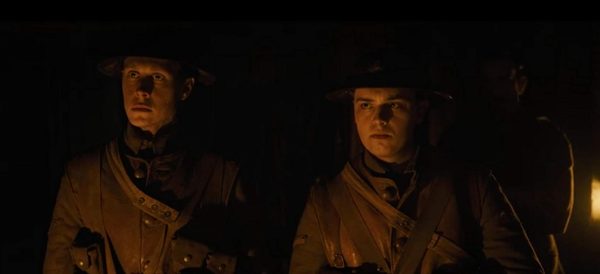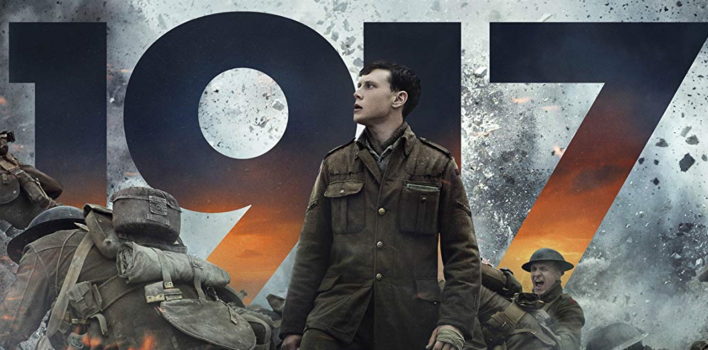1917: The Wrath and Waste of War
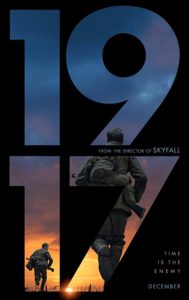 It’s common to see words like “masterpiece” or “awesome” used generously in reference to movies. Yet rarely is a film truly masterful in its execution, and even rarer still does a masterpiece leave the audience feeling awestruck at the experience. So, when I say 1917 is awesome, I mean it. I was in awe for more than a few reasons.
It’s common to see words like “masterpiece” or “awesome” used generously in reference to movies. Yet rarely is a film truly masterful in its execution, and even rarer still does a masterpiece leave the audience feeling awestruck at the experience. So, when I say 1917 is awesome, I mean it. I was in awe for more than a few reasons.
The brilliance of the (nearly) single unbroken camera shot of events that is 1917 is worth talking about at length, but I’ll leave that to film students and cinematographers. From the first scene- the entire 2 hour film really is one scene shot on one camera- the tension of the situation the two main characters find themselves in unfolds minute by minute with building intensity. Before the action ever begins, we as viewers are placed literally over the shoulder of the men on a mission into enemy territory. We see what they see, and only what they see. Gone are the shaky cams and the quick cut action sequences that have been used and abused for decades. The lack of variety in perspectives is so unassuming, however, that it all works together perfectly to translate what these men are feeling, not piercing the fog of war but rather deepening it. It’s a lesson in minimalism and beauty for anyone creating cinema.
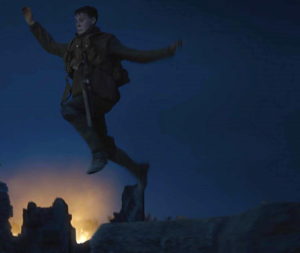 Full of intense moments of peril, unpredictable action sequences, and high tension drama, this film explores the First World War in unique ways. Instead of a massive war epic full of many characters and locales, director Sam Mendes crafts a personal, flawlessly rhythmic tale of two soldiers on a mission to save a battalion from certain destruction at the hands of the enemy. It takes place over a period of hours in April of 1917, just days after the US declared war on Germany, although this fact is inconsequential to our cast of characters (indeed, almost every fact about World War One is rendered inconsequential to the plot). Their mission is as simple as it is impossible; deliver a message to the troops across the allied front lines a few miles away. They brave no man’s land, trenches, war-torn towns, and rivers in gorgeously shot vignettes of beauty which contrast the unending horror. The perfectly paced story and hauntingly beautiful scenes move at a speed rooted in real time and fuel the immersion of the senses. Planes fly out of nowhere. Men chase down and shoot men. Shells explode and devastate both soldier and landscape. Stabbings and strangulation, blood and gore, hopeless wounds and unending anxiety are all commonplace at this level of war. To portray the conflict in such a beautiful and unwavering cinematic style is a rare skill indeed. The movie is a masterclass in scene framing and using perspective to make the audience feel uneasy, relaxed, involved, or detached. You never see more than the heroes, and you never know what lies around each corner. It’s intense, but not anxiety inducing. The balance of this film can not be overstated. The music is flawlessly timed and executed, serving to amplify and pinpoint the emotions being felt by the main characters. There’s practically no missteps evident in 1917, and I have one word for it that I’ll continue to repeat: masterful.
Full of intense moments of peril, unpredictable action sequences, and high tension drama, this film explores the First World War in unique ways. Instead of a massive war epic full of many characters and locales, director Sam Mendes crafts a personal, flawlessly rhythmic tale of two soldiers on a mission to save a battalion from certain destruction at the hands of the enemy. It takes place over a period of hours in April of 1917, just days after the US declared war on Germany, although this fact is inconsequential to our cast of characters (indeed, almost every fact about World War One is rendered inconsequential to the plot). Their mission is as simple as it is impossible; deliver a message to the troops across the allied front lines a few miles away. They brave no man’s land, trenches, war-torn towns, and rivers in gorgeously shot vignettes of beauty which contrast the unending horror. The perfectly paced story and hauntingly beautiful scenes move at a speed rooted in real time and fuel the immersion of the senses. Planes fly out of nowhere. Men chase down and shoot men. Shells explode and devastate both soldier and landscape. Stabbings and strangulation, blood and gore, hopeless wounds and unending anxiety are all commonplace at this level of war. To portray the conflict in such a beautiful and unwavering cinematic style is a rare skill indeed. The movie is a masterclass in scene framing and using perspective to make the audience feel uneasy, relaxed, involved, or detached. You never see more than the heroes, and you never know what lies around each corner. It’s intense, but not anxiety inducing. The balance of this film can not be overstated. The music is flawlessly timed and executed, serving to amplify and pinpoint the emotions being felt by the main characters. There’s practically no missteps evident in 1917, and I have one word for it that I’ll continue to repeat: masterful.
So yes. I’d say I liked 1917.
The Great War showed the entire world how brutal and all encompassing warfare can become, given the right guns and the right generals. Some theologians believe that the centuries-long cultural and societal shift away from God and towards secularism, culminating with Nietzsche, contributed to the unprecedented destruction that took place in the 20th century. God is a just judge, as we see in the Bible time and again that He does judge the wicked, both in this world and the next. God does use physical means to carry out His judgment, and the story of Ananias and Sapphiras in the book of Acts proves that this isn’t only an Old Testament event. So, if anything, this film is a reminder of what total depravity can really look like. Without Him, mankind is under the wrath of God, “For the wrath of God is revealed from heaven against all ungodliness and unrighteousness of men, who by their unrighteousness suppress the truth” (Romans 1:18). God is able to “set fire to the foundations of the mountains” and, “those who contend with the Lord shall be shattered” to the “ends of the earth”, so it’s not unrealistic to assume that God can use wars and dictators to judge nations and shatter kingdoms, even today.
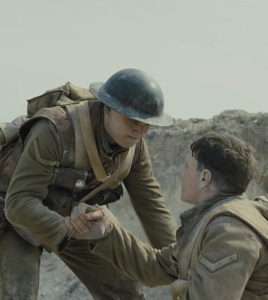 For the Christian, our focus should remain on God and His boundless mercy to sustain us every day. Jesus has done the work of saving a people for himself from all over the earth; and, for those who believe, the righteous wrath of God has been satisfied in Christ. But the Bible makes it clear that those who deny Christ will be judged, and that the purging of the ungodly will be violent. While I do my best to stay away from end-times theology, it seems clear that the judgment of God will come swiftly and fully, and we won’t have decades to debate what the nature of the judgment was precisely.
For the Christian, our focus should remain on God and His boundless mercy to sustain us every day. Jesus has done the work of saving a people for himself from all over the earth; and, for those who believe, the righteous wrath of God has been satisfied in Christ. But the Bible makes it clear that those who deny Christ will be judged, and that the purging of the ungodly will be violent. While I do my best to stay away from end-times theology, it seems clear that the judgment of God will come swiftly and fully, and we won’t have decades to debate what the nature of the judgment was precisely.
Perhaps it’s wiser to explore the more obvious message of the film, a message containing allusions to nihilism, the meaninglessness of death and conflict, the way one man can hold the lives of thousands in his hand, and how impersonal and industrialized warfare was during the Great War. During the journey our heroes see the enemy’s heartless method of withdrawal. Guns and artillery are sabotaged, Farms are purposely destroyed, livestock slaughtered and left to rot, cherry trees cut down. Every useful natural resource decimated, making the advance of the allies that much more miserable and difficult. Such imagery is shown to be a byproduct of a greater conflict happening all over Europe, but it’s also personal. What is the point of this destruction? Why stay in this war? Does the message the men must deliver, the all important high command order to stand down or lose thousands of troops, really matter in the end? If the men don’t die today, they might tomorrow. It’s inevitable.
In some senses, the Bible tells us the same message, although it’s not nearly as depressing. The Bible says plainly “…all is vanity… All things are full of weariness; a man cannot utter it; the eye is not satisfied with seeing, nor the ear filled with hearing. What has been is what will be, and what has been done is what will be done, and there is nothing new under the sun.” – Ecclesiastes 1:8-9. 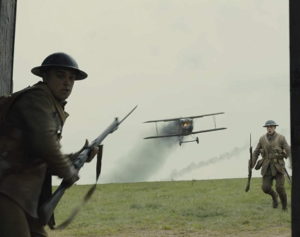 So in that sense, none of it matters. The heroes have courage and honor, both biblical virtues, and they do what is right and save many men in the process. But without the Lord, such virtues become ultimately meaningless. One officer laments that the order to stand down today is only for today, and that tomorrow or next week they will be ordered to attack at dawn, and be cut down then rather than now. Can we find a biblical message inside a film so convinced of its own pessimism?
So in that sense, none of it matters. The heroes have courage and honor, both biblical virtues, and they do what is right and save many men in the process. But without the Lord, such virtues become ultimately meaningless. One officer laments that the order to stand down today is only for today, and that tomorrow or next week they will be ordered to attack at dawn, and be cut down then rather than now. Can we find a biblical message inside a film so convinced of its own pessimism?
Certainly it’s better to look at this movie through the lens of the Christian worldview. We know that men are fallen and will continue to die and deal death until Christ returns fully and finally. But we also know that this world, with all its burnt remains, its broken societies, and its endless miseries will be completely done away with. The children of God will dwell in a new earth, so unlike this present one that it’s impossible to grasp fully. So the message of 1917 is spot on: war is a waste, and men are doomed more often than we like to admit. But that’s only half the story. It’s not what Jesus would have us dwell on, since our hope is not of this world. Pessimism will have no permanent place in the kingdom of God.
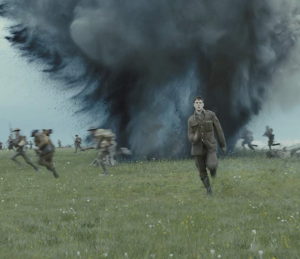 Still, the wars that so decimated humanity in the last century display the brutally horrific depravity of man. This film provides a glimpse into the pessimistic mindset some warriors had about fighting, and serves as a somber reminder about the true cost of war. A terse line from one officer sums up the grinding nature of the Great War and the understanding among the men fighting it: “There is only one way this war ends. Last man standing.” The death and chaos surrounding the heroes is framed as both random and ultimately useless. It’s just another day on the job. The brave men who fought and died surrounded by hell on earth died never knowing what benefits their sacrifice gained humanity. “Why did you have to pick me?” asks one of the men who has to risk life and limb by moving towards danger. What a great question to consider; why does fate decide who lives and who dies? Do we ever have a choice? Does it even matter? Sam Mendes seems to think the answers add up to a flat “no.” As Christians, however, we have another perspective to consider.
Still, the wars that so decimated humanity in the last century display the brutally horrific depravity of man. This film provides a glimpse into the pessimistic mindset some warriors had about fighting, and serves as a somber reminder about the true cost of war. A terse line from one officer sums up the grinding nature of the Great War and the understanding among the men fighting it: “There is only one way this war ends. Last man standing.” The death and chaos surrounding the heroes is framed as both random and ultimately useless. It’s just another day on the job. The brave men who fought and died surrounded by hell on earth died never knowing what benefits their sacrifice gained humanity. “Why did you have to pick me?” asks one of the men who has to risk life and limb by moving towards danger. What a great question to consider; why does fate decide who lives and who dies? Do we ever have a choice? Does it even matter? Sam Mendes seems to think the answers add up to a flat “no.” As Christians, however, we have another perspective to consider.
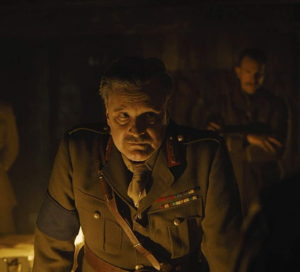 Last century many people were slaughtered and many men were shown a glimpse of the apocalypse. God was always present, even in the most unimaginable circumstances, and His decrees remain righteous eternally, no matter what happens. Again, this is a good reminder for Christians, especially men who might wonder “what if that were me fighting the war?”, to be reminded of God’s love and mercy. He is sovereign, and the Bible gives complete certainty to all who trust Him.
Last century many people were slaughtered and many men were shown a glimpse of the apocalypse. God was always present, even in the most unimaginable circumstances, and His decrees remain righteous eternally, no matter what happens. Again, this is a good reminder for Christians, especially men who might wonder “what if that were me fighting the war?”, to be reminded of God’s love and mercy. He is sovereign, and the Bible gives complete certainty to all who trust Him.
“For I am sure that neither death nor life, nor angels nor rulers, nor things present nor things to come, nor powers, nor height nor depth, nor anything else in all creation, will be able to separate us from the love of God in Christ Jesus our Lord.”
—Romans 8:38-39
Having witnessed this film, a dismal and sobering dramatization of the horrors man can conjure, the Christian can’t help but look back to the promises given in Christ, and the hope that must never be abandoned. The allies claimed victory by the end of the war, but it’s safe to say that everyone involved lost immensely. This movie brilliantly compels men and women over a century later to come face to face with the misery, the glory, the valor, and the horror that war can bring about. It’s well worth viewing for all these reasons and more.
